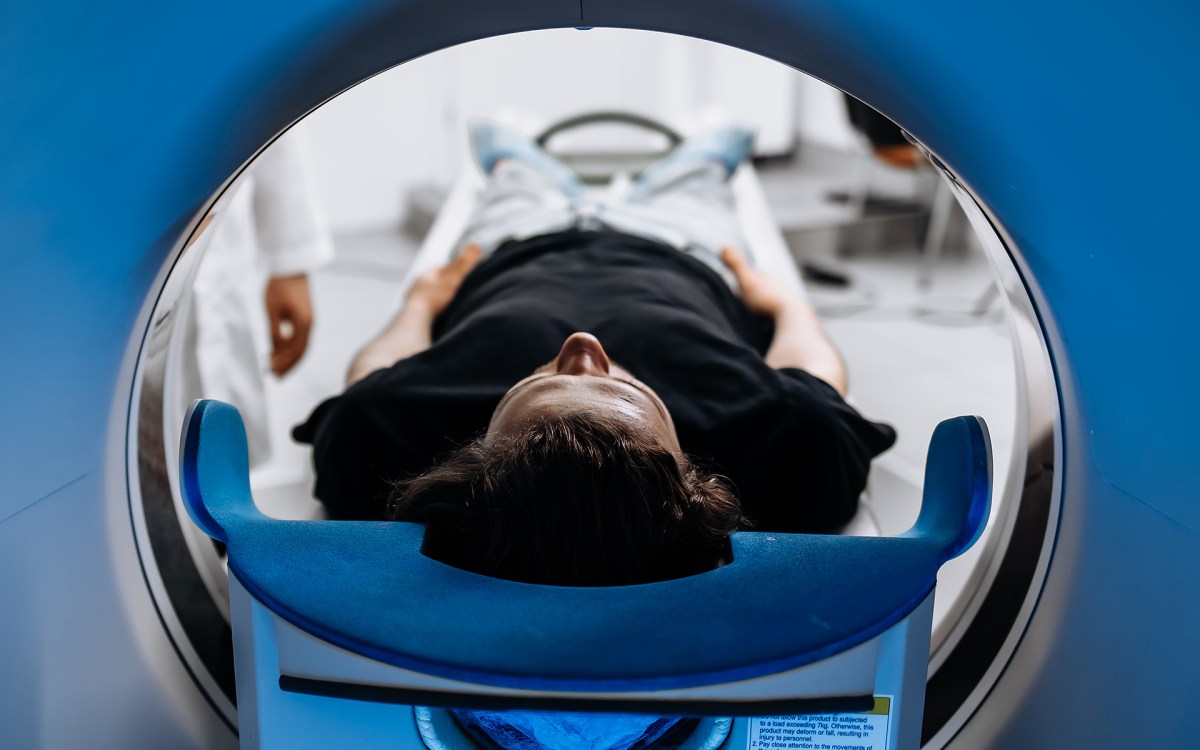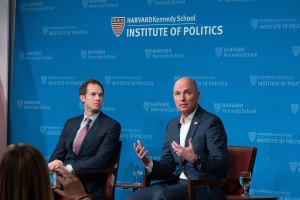Tag: Research
-
Science & Tech
CfA reveals Magellanic Clouds are first-time visitors
The Large Magellanic Cloud (LMC) and Small Magellanic Cloud (SMC) are two of the Milky Way’s closest neighboring galaxies. A stunning sight in the southern hemisphere, they were named after the Portuguese explorer Ferdinand Magellan, who explored those waters in the 16th century. For hundreds of years, these galaxies were considered satellites of the Milky…
-
Health
Scientists synthesize memory in yeast cells
Harvard Medical School (HMS) researchers have successfully synthesized a DNA-based memory loop in yeast cells, an experiment that marks a significant step forward in the emerging field of synthetic biology.
-
Health
State’s health care plan assessed
An architect of Massachusetts’ year-old experiment with universal health coverage said Monday (Sept. 17) that because of the experiment 170,000 people have insurance today who otherwise would not, but that the problem may be bigger than initially thought.
-
Arts & Culture
Pair of music professors to collaborate on improvisation project
Headed by University of Guelph English professor Ajay Heble, the international “Improvisation, Community, and Social Practice” project recently secured a $2.5 million grant from the Social Sciences and Humanities Research Council of Canada. Harvard affiliates Ingrid Monson, Quincy Jones Professor of African-American Music, and Jason Stanyek, visiting associate professor of music, are among the project’s…
-
Arts & Culture
Ulrich explains that well-behaved women should make history
Most bumper sticker slogans do not originate in academic publications. However, in the 1970s, Laurel Thatcher Ulrich penned in a scholarly article about the funeral sermons of Christian women that “Well-behaved women seldom make history.” The phrase subsequently gained wide popularity, appearing on T-shirts, coffee mugs, and other items — and it’s now the title…
-
Arts & Culture
Study abroad program sings
This summer, five Harvard College students exchanged dorm life for West African village life to investigate the role of music and dance in Malian culture. As participants in Harvard’s summer study-abroad program “Music and Dance in Mali — Ethnography in Practice,” the students had the opportunity to live among and learn from some of the…
-
Campus & Community
China Fund issues first round of funding
Three research proposals were recently selected to receive primary funding from the Harvard China Fund. Launched in July 2006, the fund supports China-related activities University-wide and University activities in China.
-
Campus & Community
HCA announces its 2007 Australia-Harvard Fellowships
The Harvard Club of Australia (HCA) recently announced four winners of its 2007 Australia-Harvard Fellowships. The recipients are associate professor of ambulatory care and prevention Matthew W. Gillman of Harvard Medical School; Avi Loeb, professor of astronomy, Harvard-Smithsonian Center for Astrophysics; Michael N. Starnbach, associate professor of microbiology and molecular genetics at Harvard Medical School;…
-
Health
Humanitarian aid professionals strategize
The public and private agencies that respond to war and disasters sometimes respond disastrously — and it’s time to do something about it. That was the basic message of a three-day Humanitarian Health Conference at Harvard Sept. 6-8, which drew more than 120 emergency physicians, epidemiologists, and professional aid workers from 68 organizations.
-
Campus & Community
‘We are all teachers and we are all learners’
The threat of thunderstorms on Sunday (Sept. 9) persuaded planners of the Opening Exercises for the Class of 2011 to move the event from the tree-shaded lawns of Tercentenary Theatre to the varnished vaults of Sanders. The venerable auditorium, Harvard’s largest indoor venue, was filled to capacity by the crowd of freshmen and their parents.
-
Arts & Culture
Center for the Technical Study of Modern Art announces landmark gift
The Center for the Technical Study of Modern Art (CTSMA), a leading research center of the Harvard University Art Museums, has announced a major gift of Barnett Newman’s studio materials and related ephemera through the generosity of The Barnett and Annalee Newman Foundation.
-
Health
Stem cells make new heart valves
Researchers have coaxed adult stem cells into forming artificial heart valves that could one day mean fewer surgeries for children suffering from heart defects.
-
Campus & Community
Mathematician Taylor wins Shaw Prize
Herchel Smith Professor of Mathematics Richard Taylor has been awarded the Shaw Prize in Mathematical Sciences for work that unified the diverse fields of prime numbers and symmetry. Taylor shares…
-
Science & Tech
Biohybrid of elastic film and muscle cells packs a punch
In an innovative marriage of living cells and a synthetic substrate, bioengineers at Harvard University have found that a rubberlike, elastic film coated with a single layer of cardiac muscle cells can semi-autonomously engage in lifelike gripping, pumping, walking, and swimming.
-
Campus & Community
First class of Ruffolo Fellows introduced at Kennedy School ceremony
A ceremony was held Sept. 21 at the Kennedy School of Government (KSG) announcing the establishment of the Giorgio Ruffolo Fellowships in Sustainability Science and introducing the first Ruffolo Fellows to the Harvard community.
-
Health
Primates expect others to act rationally
When trying to understand someone’s intentions, nonhuman primates expect others to act rationally by performing the most appropriate action allowed by the environment, according to a new study by researchers…
-
Arts & Culture
New research challenges previous knowledge about the origins of urbanization
Ancient cities arose not by decree from a centralized political power, as was previously widely believed, but as the outgrowth of decisions made by smaller groups or individuals, according to a new study from researchers at Harvard University, the University of Cambridge, and the University of Edinburgh.
-
Health
Scientists have something to chew on
In a groundbreaking study, two Harvard scientists have for the first time extracted human DNA from ancient artifacts. The work potentially opens up a new universe of sources for ancient genetic material, which is used to map human migrations in prehistoric times.
-
Science & Tech
Creating a computer currency
Computer scientists are using the latest version of peer-to-peer video sharing software to explore a next-generation electronic commerce model that uses bandwidth as a global currency.
-
Health
First orchid fossil puts showy blooms at some 80 million years old
Biologists at Harvard University have identified the ancient fossilized remains of a pollen-bearing bee as the first hint of orchids in the fossil record, a find they say suggests orchids are old enough to have coexisted with dinosaurs.
-
Health
Brain implants relieve Alzheimer’s damage
Genetically engineered cells implanted in mice have cleared away toxic plaques associated with Alzheimer’s disease.
-
Campus & Community
Wagers named ‘Distinguished Young Scholar in Medical Research’
Assistant Professor of Pathology Amy Wagers of the Harvard-affiliated Joslin Diabetes Center has been named to the W.M. Keck Foundation’s 2007 class of Distinguished Young Scholars in Medical Research.
-
Campus & Community
Young scientists do summer research
During this short hot summer, approximately 120 undergraduate scientists spent more time on the laboratory bench than at the local beach. These fledgling biologists, chemists, and engineers were participating fellows in the Harvard College Program for Research in Science and Engineering (PRISE).
-
Nation & World
IFC, U.N. to cooperate on study of investment contracts and human rights
The International Finance Corp. (IFC), which is a member of the World Bank Group, and Kennedy School of Government (KSG) Professor John Ruggie, who is the United Nations secretary-general’s special representative on business and human rights, recently launched a joint study on foreign direct investments and human rights.
-
Health
Man-made medical mystery gets second solution
Researchers have created a new material that they believe improves on an eight-year-old solution to a decades-long medical mystery over the cause of widespread artificial joint failure. The new material, developed at Harvard-affiliated Massachusetts General Hospital (MGH) and implanted for the first time July 19, could help fill the demand for higher-performance joints from a…
-
Health
Human stem cells help monkeys recover from Parkinson’s
Richard Sidman, Bullard Professor of Neuropathology Emeritus at Harvard Medical School (HMS), and colleagues from Harvard and other universities and medical schools published the first report of a promising attempt to treat Parkinson’s in a humanlike animal in the July 17 issue of the Proceedings of the National Academy of Sciences.
-
Health
New science provides compelling framework for early childhood investment
A remarkable convergence of new knowledge about the developing brain, the human genome, and the extent to which early childhood experiences influence later learning, behavior, and health now offers policymakers an exceptional opportunity to change the life prospects of vulnerable young children, says a new report from the Center on the Developing Child at Harvard…
-
Health
Sensory organ differentiates male/female behavior in some mammals
For years, scientists have searched in vain for slivers of the brain that might drive the dramatic differences between male and female behavior. Now biologists at Harvard University say these efforts may have fallen flat because such differences may not arise in the brain at all.
-
Health
Broken hearts found to mend themselves
Stem cells apparently try to mend hearts damaged by heart attacks or high blood pressure. But they do not refresh hearts run down by aging. Evidence for this heartening and disheartening news comes from experiments with mice done at Harvard Medical School (HMS) and Brigham and Women’s Hospital in Boston.
-
Health
Youngest girls spirited to brothels show highest HIV rates
Girls forced into the Indian sex trade at age 14 or younger show significantly higher rates of HIV infection than older girls and women similarly forced into prostitution, according to a new study that highlights for the first time the increased HIV risks faced by sex trafficked Nepalese girls and women.


